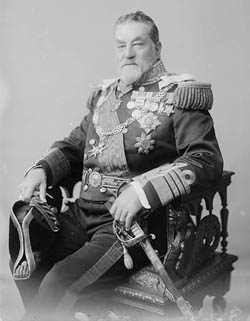Get Today in Masonic History into your Inbox. Sign up today for one of our email lists!
Need an article for your Trestleboard/Newsletter see our Use Policy
Harry Holdsworth Rawson is Born

Today in Masonic History Harry Holdsworth Rawson is born in 1843.
Harry Holdsworth Rawson was a British naval officer and colonial governor.
Rawson was born on Novermber 5th, 1843 in Walton-on-Hill, which is now known as Walton, an area of Liverpool, England. In 1857 he joined the Royal Navy. He took part in the capture of Taku Forts, a name given to a region in China, which was part of the Second Opium Wars. By 1877 he was promoted to Captain. His first command was the HMS Minotaur. In 1883 he was the Commander-in-Chief of the Mediteranean Fleet.
In 1895, after being promoted to Admiral, Rawson was involved in serveral operations in Africa. He was in charge of the Benin Expedition which has been called in British circles as a stroke of discipline and coordinated planning. In the engagmenent a force of 1,200 men where landed, took the city of Benin, the ships were refueled with coal and the men reloaded all in 29 days. Another mark of Rawson's efficiency is that he was in command of the British Forces during the what is called the shortest war in history. The Anglo-Zanzibar War lasted a total of 38 minutes. For this, Rawson was knighted and presented with several different orders.
In 1902, Rawson was appointed as the Governor of New South Wales. He was the first Naval Officer to hold that position since Captain Bligh, who was made famous because of the mutiny on the HMS Bounty. Bligh as Governor of New South Wales was not well liked and was removed from his command as Governor a similar manner to the Bounty mutiny. Rawson was exactly the opposite and was so well liked that his term as Governor was extended. When he was appointed by King Edward VII, Rawson joined the King kissing hands in the audience.
Rawson donated a cup (the Rawson Cup) to the Univeristy of Sydney. The four male schools that are part of the University system compete every year for the cup. The competition consists of 8 sports and points are awarded after each victory.
Rawson passed away in London 2 days before his 68th birthday on November 3rd, 1910. He passed away after having surgery for apendicitis.
Rawson served as the Grand Master of the United Grand Lodge of New South Wales and the Australian Capital Territory.
This article provided by Brother Eric C. Steele.

